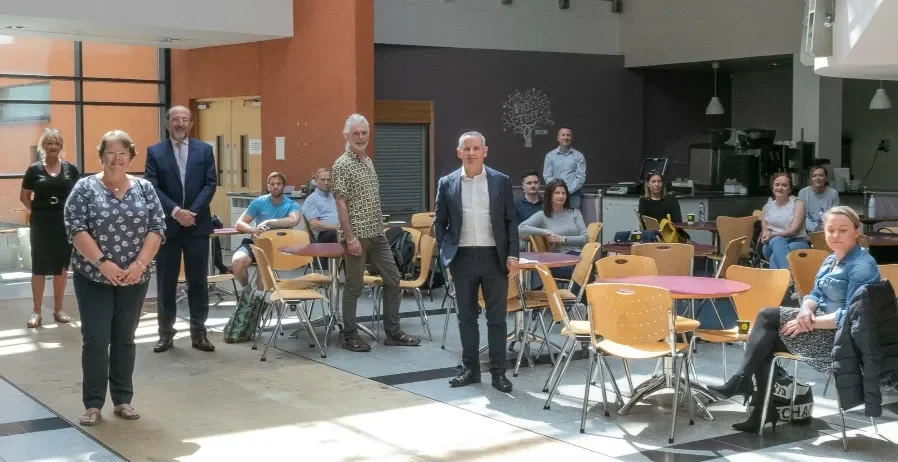

The SoBT and COVID-19 – The Contact Tracing Centre
COVID-19 has, and continues to have, a significant impact on the global population. In the past few months, as rates of incidence swelled, there is no doubt the virus in question has affected the lives of everyone the world over. Upon confirmation the virus had reached Ireland, the numbers of incidences steadily increased in the weeks that followed. The reaction needed to be swift - and owing to the co-ordinated efforts of the Government, the Health Service Executive (HSE), and institutional bodies they continue to liaise with today, our country has seen many people of different training and skillsets devote time and energy to co-ordinated efforts against the SARS-CoV-2 virus.
 Dr. Robert Wallace is a post-doctoral researcher of the Assoc Prof. Phil Cummins Endothelium Biology Group based in Dublin City University. Upon COVID-19 reaching pandemic status, he is one of many from the School of Biotechnology who answered the call to volunteer and assist the HSE in efforts to monitor and control the spread of coronavirus in our country.
Dr. Robert Wallace is a post-doctoral researcher of the Assoc Prof. Phil Cummins Endothelium Biology Group based in Dublin City University. Upon COVID-19 reaching pandemic status, he is one of many from the School of Biotechnology who answered the call to volunteer and assist the HSE in efforts to monitor and control the spread of coronavirus in our country.
In the first part of our series covering contributions from members of the School of Biotechnology, Dr. Wallace details his experiences over the last several number of weeks at the Contact Tracing Centre located on DCU campus.
‘The DCU Contact Tracing Centre (CTC) was established by the School of Nursing , Psychotherapy & Community Health within days following HSE training in RCSI in March, and is one of a number of CTCs around the country as part of the national emergency response to COVID-19. Contact tracing is carried out by DCU staff, particularly from the Faculty of Science and Health, who work as volunteers in conjunction with re-deployed civil servants. Staff from the School of Biotechnology and NICB, including Dr. Donal O’Gorman, Dr. Neil Conlon, Patricia Flannagan and I, volunteered to be part of this CTC team. Based in the Nursing building on the Glasnevin campus with a separate team operating remotely, we work in small groups in compliance with social distancing and best hygiene practice. Our familiar and vibrant Fig Tree Café has become a cavernous and empty space. Here, we hold our group meetings and strain to communicate because of the required distance between speakers’.
Making calls on behalf of Public Health in the HSE, contact tracing serves three main purposes:
1. To inform people of their positive status and give advice on how to effectively self-isolate.
2. To acquire details of all close contacts with the positive case.
3. To reach out to those close contacts to advise them of their need to quarantine.
‘While they often have additional complexities, all three call types require compassion and resolve. Covid-19 affects all ages and all aspects of society. While some of us possess different language skills, we must often rely on translation services to communicate with those for whom English is not their first language. In making our calls, we connect with the various people that together form our shared community. We encounter the full spectrum of human emotion: sad, bereaved, fearful, angry, relieved or lonely people; but often people filled with hope, love and concern for their families. Every call is different, and every call makes a difference’.
‘Staff members from the School of Nursing, Psychotherapy & Community Health, in particular, are an enormous asset, helping those of us who would typically deal with familiar lab techniques to adapt and learn new skills in communicating with people and computer systems alike. Morning briefings led by Dr. Donal O’Gorman, Dr. Líam MacGabhann, Dr. Siobhan Rothwell and Dr. Melissa Corbally enable us to remain up-to-date with the ever evolving needs of the situation as they develop, and the many IT system changes and challenges that occur in order to facilitate the data acquisition that helps to inform national policy’.
‘It is an experience that has enabled me to get to know my colleagues in a different light. Colleagues that I previously would have known to see, or didn’t know at all, have now become firm friends'.
'I initially volunteered my lab skills as part of the DCU response. Instead, I find myself part of a DCU contact tracing team with a strong sense of purpose, together making an active and meaningful difference in this national response where every Irish citizen plays their part’.
